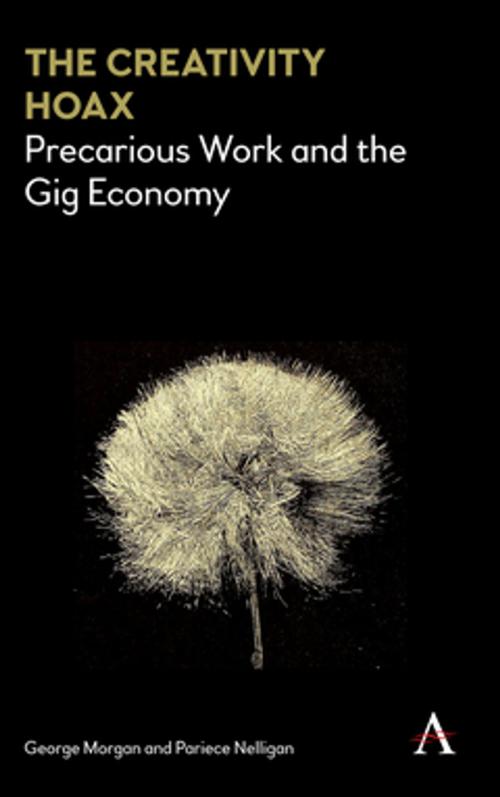The Creativity Hoax
Precarious Work and the Gig Economy
Nonfiction, Social & Cultural Studies, Social Science, Sociology, Urban| Author: | George Morgan, Pariece Nelligan | ISBN: | 9781783087198 |
| Publisher: | Anthem Press | Publication: | January 22, 2018 |
| Imprint: | Anthem Press | Language: | English |
| Author: | George Morgan, Pariece Nelligan |
| ISBN: | 9781783087198 |
| Publisher: | Anthem Press |
| Publication: | January 22, 2018 |
| Imprint: | Anthem Press |
| Language: | English |
We often hear that creative and intellectual innovation is the key to western economic renewal, that cognitive capitalism has succeeded in globalizing the mental-manual division of labour, and that old work – blue-collar, repetitive, de-skilled – is now consigned to the factories of the developing world. At the other end of the long production chains, the West relies increasingly on immaterial labour. From this perspective no rustbelt city can hope to regenerate, no developing nation can ascend to first-world status, without the ‘new oil’ of intellectual property. Workers in general are told to adapt to this transition, to remake themselves for the new economy. Rapid shifts in patterns of consumption, taste and technology can render jobs and skills obsolete in ways that defy the planning and foreclosures of Fordism.
Vocational fortunes depend not only on intellect and creativity but also on entrepreneurial acumen and vocational agility. New capitalism seeks to make a virtue of transience. It has taken up the counter-culture’s critique of the Fordist job-for-life, in order to persuade young people in particular that working life is (and should be) episodic and project-based. The precariat (Standing 2009) must embrace the idea of the improvised post-modern career - a wild vocational ride that unfolds like the levels of a video game. They must become labile labour: opportunistic, excitable, flexible, mobile and ready to flow without protest or friction into the spaces opened up by Post-Fordism. Those who resist or ignore this turbulence and cling to the goal of security are in effect sleepwalking towards redundancy.
‘The Creativity Hoax’ argues that creativity, the leitmotif of new capitalism, has become a key neo-liberal idiom for reorganizing work and working life in ways that erode communal bonds, loyalties and values and blur the boundaries between work and play, public and private. However, the creative economy remains a largely unrealized project, a fantasy of regeneration. Despite the inflated rhetoric of vocational fulfilment, much work performed in the West remains low-skilled and low-paid. Very few make a living exclusively from creative labour whether as employees, freelancers, or entrepreneurs. For the most part it is transnational cultural corporations that reap the patentable or copyrightable bounty, belying the egalitarian myths of the new economy. [NP] The challenge for capital has been to habituate the precariat to the condition of abeyance. In order to tolerate un/underemployment or jobs where skills and talents are underutilized (retail, hospitality or on the edges of creative industries), young workers need to be persuaded that vocational fulfilment and financial security are attainable. ‘The Creativity Hoax’ draws on extensive interview and observation research with creative aspirants – from technical, production and performance fields – who wrestle with the prospect and reality of poverty and unfulfilled ambition.
We often hear that creative and intellectual innovation is the key to western economic renewal, that cognitive capitalism has succeeded in globalizing the mental-manual division of labour, and that old work – blue-collar, repetitive, de-skilled – is now consigned to the factories of the developing world. At the other end of the long production chains, the West relies increasingly on immaterial labour. From this perspective no rustbelt city can hope to regenerate, no developing nation can ascend to first-world status, without the ‘new oil’ of intellectual property. Workers in general are told to adapt to this transition, to remake themselves for the new economy. Rapid shifts in patterns of consumption, taste and technology can render jobs and skills obsolete in ways that defy the planning and foreclosures of Fordism.
Vocational fortunes depend not only on intellect and creativity but also on entrepreneurial acumen and vocational agility. New capitalism seeks to make a virtue of transience. It has taken up the counter-culture’s critique of the Fordist job-for-life, in order to persuade young people in particular that working life is (and should be) episodic and project-based. The precariat (Standing 2009) must embrace the idea of the improvised post-modern career - a wild vocational ride that unfolds like the levels of a video game. They must become labile labour: opportunistic, excitable, flexible, mobile and ready to flow without protest or friction into the spaces opened up by Post-Fordism. Those who resist or ignore this turbulence and cling to the goal of security are in effect sleepwalking towards redundancy.
‘The Creativity Hoax’ argues that creativity, the leitmotif of new capitalism, has become a key neo-liberal idiom for reorganizing work and working life in ways that erode communal bonds, loyalties and values and blur the boundaries between work and play, public and private. However, the creative economy remains a largely unrealized project, a fantasy of regeneration. Despite the inflated rhetoric of vocational fulfilment, much work performed in the West remains low-skilled and low-paid. Very few make a living exclusively from creative labour whether as employees, freelancers, or entrepreneurs. For the most part it is transnational cultural corporations that reap the patentable or copyrightable bounty, belying the egalitarian myths of the new economy. [NP] The challenge for capital has been to habituate the precariat to the condition of abeyance. In order to tolerate un/underemployment or jobs where skills and talents are underutilized (retail, hospitality or on the edges of creative industries), young workers need to be persuaded that vocational fulfilment and financial security are attainable. ‘The Creativity Hoax’ draws on extensive interview and observation research with creative aspirants – from technical, production and performance fields – who wrestle with the prospect and reality of poverty and unfulfilled ambition.















